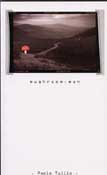mushroom.man (Amazon.co.uk)
Before procuring a copy of *mushroom.man* by Paolo Tullio, author of *North of Naples, South of Rome*, I was apprehensive — even cynical — about reading an Irish novel with a subplot which utilises an exchange of email message exchanges between the two first-person narrators. Indeed, I had an olfaction of bandwagon-hopping in pursuit of bestseller heaven.
I was however, wrong. *Mushroom.man* diluted my doubts, and for me, shook dust from old oxidised trains of thought with a clarity I’ve rarely encountered outside the works of Robert Anton Wilson or Paul Devereux.
The novel concerns itself with two main characters, a young British psychologist sojourning in the University of Iowa, who stumbles across the Internet postings of the mysterious mushroom.man, an ex-artificial intelligence programmer who has dropped-out to live a life of recreational, academic, spiritual and culinary mycology [1], somewhere in the depths of the Irish countryside.
The psychologist, frustrated by the loneliness of his academic exile, seeks escapism, and attempts to find just what makes his mystery mycologist tick. He begins with direct interrogation — to no avail, instead receiving brush-offs in the shape of oblique meandering messages — possible cryptic analogies in answer to questions, or just whatever mushroom.man feels like ranting about.
The mushroom man states his abhorrence of proselytism, subtly forcing the ‘student’ to ask indirect questions in order to receive more direct — if slightly irrelevant answers. As the email relationship develops, we learn more about the ascetic earthy life of the mushroom.man, his demons, his ghosts, his tormentors, neighbours (local cocaine dealers and immortalist cults) and past loves, as well as his various insights into life, death and the world of hallucinogens. The mood for each chapter is set by accompanying fungi illustrations and short descriptions, their characters so befitting as to prove that Tullio — himself a Co. Wicklow restaurateur — knows his ‘shrooms.
Inspired, the psychologist integrates the ravings of the mushroom.man into an academic paper entitled ‘Chronic Abuse of Psychedelics’, trying in vain to steer the course of the results to achieve the result he desires — to prove that the the mushroom man has displayed schizophrenic behaviour which can be blamed on the intake of mushrooms. Hardly excusable scientific methodology . . .
Tullio’s talent really shines through to a deeper level, when it becomes more apparent to the reader that they can identify themselves with *both* characters — one a well-behaved conservative striving to escape a humdrum existence, and the other a semi-hermit, torn between asceticism and frail sociability, whilst coping with what might — or might not — be enlightenment.
Several currently hot memes make an appearance, Tullio explaining them in such a manner as to educate the uninformed reader without breaking pace. In particular, the mushroom.man’s opinion towards artificial intelligence; are we really in a position to create ‘artificial intelligence’, while unable to define just what intelligence is? The mushroom.man also raves about of fractals, analogising them in the context of trying to measure a ragged shoreline — how small is an inlet?
Paolo Tullio’s *mushroom.man* is a warm, *useful* and quite remarkable publication, which I would have no hesitation in recommending. Apart from all else, it’s the first fictional work I’ve come across in *any* media that has convincingly dealt with the day-to-day Internet experience.
– daev
purchase mushroom.man (Amazon.co.uk)

